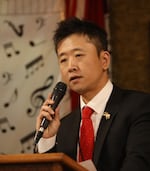The Oregon Republican Party has its third new leader in less than a year and a half, after the unexpected resignation of its acting chair last week.
Justin Hwang, a Gresham restaurateur and former legislative candidate, has stepped into the role of party chair after being elected vice-chair in late May, the party announced Wednesday. Hwang fills the spot left by outgoing chair Herman Baertschiger Jr., who recently announced he was resigning effective Tuesday, July 5.
“I’m excited to bring a fresh voice to the Party along with my years of experience as a small business owner,” Hwang said in a statement Wednesday. “My colleagues and I are ready to get to work and we only have one vision in mind for 2022 — to elect more Republicans to office.”

Justin Hwang, a Gresham restaurant owner, was named the new chair of the Oregon Republican Party on July 6, 2022.
Courtesy of Oregon Republican Party
The owner of a chain of Portland area teriyaki restaurants, Hwang emigrated to the U.S. from South Korea when he was young, obtaining his citizenship in 2006. He ran for the state House in 2018 and the state Senate in 2020, losing both times to now-state Sen. Chris Gorsek, D-Troutdale. He is the first Korean American to serve as the chair of the state party.
Hwang’s ascension marks the latest turn in a volatile election cycle for the Oregon GOP. It comes in a year when national trends are expected to favor Republicans. The party is hoping to dig out of the minority in the state Legislature, claim at least one more of Oregon’s six congressional seats, and win the governor’s mansion for the first time in four decades.
In March of last year, state Republican party officials bounced much of their existing leadership team, tapping state Sen. Dallas Heard of Myrtle Creek as the party chair. In the same election, Baertschiger, a Josephine County commissioner and former state senator, won the role of vice-chair. State Sen. Dennis Linthicum, R-Klamath Falls, took on the role of treasurer.
But roughly a year later, Heard resigned his chairship, complaining of “endless slander, gossip, conspiracies, sabotage, lies, hatred, pointless criticism, blocking of ideas, and mutiny brought against my administration” by fellow Republicans. He remains a state senator.
Heard’s resignation meant that Baertschiger, as vice-chair, moved into the top party role. On May 21, party officials met to “overwhelmingly” elect Hwang as the party’s new vice-chair, according to Oregon GOP spokeswoman Robin Besotes.
But last week, Baertschiger also quit.
“As many of you already know I have never intended to be the Chairman of the ORP, however it has been an honor,” he wrote in a resignation letter obtained by the site Oregon Catalyst. “I ran as Vice-Chair, a supporting role within the leadership of the ORP.”
Baertschiger said that he’d provided continuity for the party as it filled several roles, including the vice-chair spot taken by Hwang. “It is time to pass the torch,” he wrote. “I am sure they will do a great job for the party as well as for Oregon.”
Under the party’s bylaws, the chair of the Oregon GOP has the authority to call meetings, appoint members to party committees, hire and fire staff, and act as a liaison to the Oregon Secretary of State on the party’s behalf. Inquiries to both Hwang and Baertschiger were not immediately returned Wednesday.
While the state parties play a role in voter engagement and grassroots organizing, they have little to do with the bulk of campaign work that will determine whether GOP candidates are successful this fall.
Republican members in both the House and Senate run their own campaign arms, which are responsible for recruiting qualified candidates and running competitive races. High-profile candidates for governor or Congress are often more reliant on national party groups than the state party apparatus.
That disconnect between state party members and the elected officials who bear the GOP standard was on full display in January 2021, not long after the Jan. 6 insurrection at the U.S. Capitol.
On Jan. 19, members of the Oregon GOP’s 22-person executive committee approved a resolution that suggested, in part, that the attack might have been a “false flag” designed by foes of President Donald Trump in order to discredit him. That prompted Republicans in the state House — led by Christine Drazan, now the GOP nominee for governor — to issue a statement criticizing the state party.
“The election is over,” the statement said in part. “It is time to govern.”
Hwang’s statement on Wednesday suggested he would dwell less on conspiracy theories than on the issues Republicans around the nation are counting on to win in the fall.
”With record inflation and insane gas prices, rampant homelessness, and lack of leadership from Kate Brown and Joe Biden, we know that Oregonians are fed up and ready for change,” the statement said. “The ORP is committed to doing the work to ensure the red wave comes to Oregon this November.”



